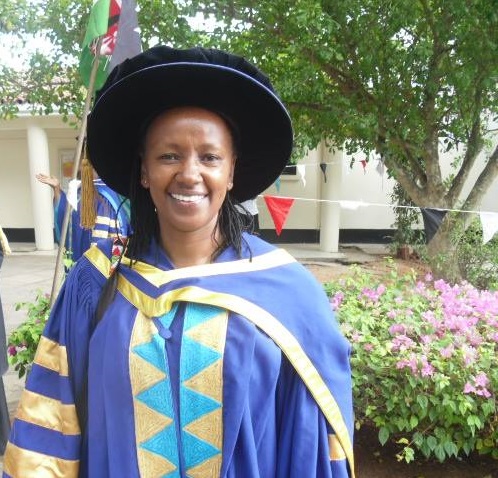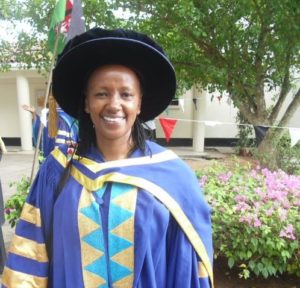
Doctoral training – let’s think it through
I took this photo during a graduation ceremony in Pwani University – just before we walked into the graduation square. I could hear the lady students pointing and counting all the female lectures wearing gowns indicating that they had PhD’s and it was flattering to see that they were clearly thrilled that there were many of us on the queue.
It is likely that many more women will be marching to the graduation square after President Kenyatta recently announced a government commitment along with 4 other African countries to training about 10,000 new PhD’s in the next 10 years.
kenya-commits-eight-hundred-million-set-up-scholarship-fund
Assuming that this number is distributed equally in all 4 countries – Kenya shall have 2,500 new PhD’s by 2027. Considering that at the moment, there are just over 5,000 PhD’s in our education system, this newly trained specialists will be much needed. However, even the Commission for University Education (CUE), will admit that this is still well below what is required. CUE has complained about the low PhD enrolment in the country….
CUE-raises-alarm-over-low-PhD-enrolments-as-deadline-looms
Although CUE may complain about the poor rate of enrollment for PhD’s – there are many reasons why the academic path is not very enticing. You need dogged determination to work your way through the Kenyan system of education through to a PhD. You will need to have earned a master’s degree before you apply for PhD training.
In research institutes, there are projects in which PhD students lock in and get the training they need. This is what happens in many developed countries and there are also some institutes in Kenya that offer this system of training. For example, KEMRI in Kilifi offer regular PhD studentships in which those with the willingness to put in the hard work get locked into a project that is already funded and ready to go…..
http://careers.kemri-wellcome.org/phd_studentships
A student who qualifies on this program knows that they will not run out of funding for their research and will receive a stipend to foot their regular bills. The supervisors are experts in their fields and they will publish excellent papers from their work.
However, if you are lecturer at a public university, wanting to go into PhD training – you need to think of a project and then get funding for it. When I joined Pwani University and we started to receive PhD proposals – the projects did not necessary match the training we as lecturers had and were too varied. Across universities, a supervisor would be dealing with widely differing topics -many in fields in which they have little experience in. Some PhD’s were too ambitious. Some students wanted to take on exciting studies but were unwilling to do the rigorous work required in order to get the projects into internationally recognized PhD material.
It is all well and good to pour money into funding PhD students – but perhaps it is wiser to get more funding for research available to lecturers with PhD’s in the university. A lecturer with a PhD will only be funded to do research in an area for which they have relevant experience. This funding should have a compulsory clause for training. A PhD student will then enroll into a project that is fully funded with a supervisor who knows what they are doing. This becomes a win – win situation.
Other issues also play a part in low PhD enrollment in Kenya – training takes too long and lecturers are burdened with too much teaching and the gains from pursuing a PhD may not match the effort of getting one.
Since the introduction of the parallel programs – things on the teaching front have only gotten worse. For those not in the know:- public universities now take on two batches of students, those on government bursaries and those who pay fully for their training. The government funded students are on the ‘regular’ program and the ones that pay for their training are on the ‘parallel’ program. The same lecturers teach on the ‘regular’ programs and are also expected to teach on the ‘parallel’ programs. Some of the timetables for those on the ‘parallel’ programs are offered on weekends and holidays. This means that lecturers have simply no time to think about research.
And then the empty pockets…….
By the time you are settling into your university job, PhD in your pocket – your colleagues are well settled, many in well paid jobs and you do look a bit lame with your colorful robes and nothing to show for it in your pocket. It is little wonder that many lecturers take on several teaching jobs – moonlighting in various universities. Many take on consultancies. Very few get into active research. Lecturers have children to feed and take to school. They also want to live in their own homes. Taking on PhD students with their projects that are all over the place and putting them through the training is not a top priority.
Pouring money into PhD training is something we all want – it is about time that African scientists addressed the problems in the continent the way they feel it should be handled. Many are interested in finding out whether the wisdom of our ancestors can be proven scientifically. The Chinese embraced modern medicine without throwing away their ancient healing practices and now we are copying them. We need to disprove or prove our healing practices too.
The cures for the diseases of the modern age – especially mental health issues – can come from anywhere – Africans should be ready to answer scientific questions and meet international thresholds of evidence collection.
While the veterinarian in Kenya is exporting vaccines to other African countries – thanks to KEVEVAPI – The Kenya Veterinary Vaccine Production Institute – we are still importing human vaccines. We have no laboratories to develop and produce human vaccines. We need more vaccinologists.
A Kenyan came up with M-pesa …. there is so much we can do – if we use our wealth wisely.
To do this – our senior researchers need to be able to pay their bills so that they can focus on training the next generation of researchers. They need to have functioning research laboratories and less of the teaching burden. They need even more support.
Comments
-
-
Wam
It’s very difficult to get a funded PhD in Kenya. I got a PhD scholarship last year but had to turn it down as they were not providing stipend and I couldn’t quit my job and relocate to rural Kenya without means to support myself. Would you advise a person to do a self-funded PhD by taking a loan from HELB?
-
-
-
-
Comments are closed.




Tutu Nderitu Wanjiru
This is very informative piece. As a PhD student, we often joke that we are pushing ourselfs out of the market since there is little appreciation for holders.